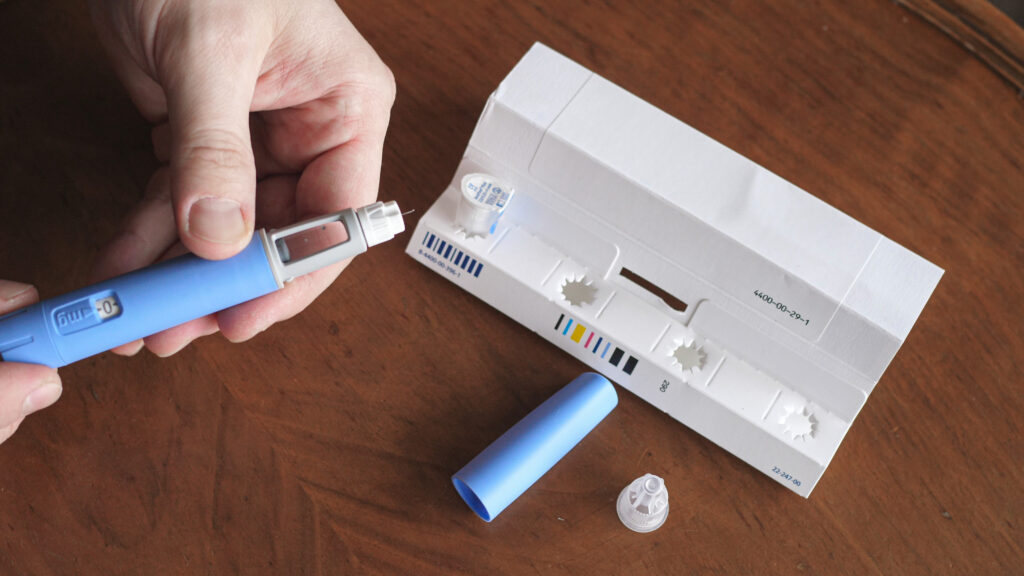Are New Weight Loss Drugs Safe To Take?


Something interesting happened when physicians started prescribing medications that were developed for people with type 2 diabetes. . .they saw that these patients often experienced a reduced appetite followed by weight loss. The most popular currently, Semaglutide (sold as Ozempic, Wegovy, Mounjaro and others), affects hormones and appetite to help people lose weight. These drugs are currently trending on social media and the news, with many influencers touting them as a miracle weight loss drug.
But just like everything in the nutrition-world, there is a complex list of pros, cons, and questions that are left to be explored when it comes to these and other weight loss medications. If you’ve been wondering about all these weight loss drugs buzzing in the news and online, it’s time to better understand what they are, who they’re for, and some of the ethics and considerations behind using them.
 How Weight Loss Medications Work
How Weight Loss Medications Work
There are many classes of weight loss medications that work in a variety of ways, from stimulants like ephedra (now banned) in the past to the newer, FDA-approved medications. Major categories of currently approved drugs include:
- Iraglutide (Saxendra), which helps regulate the hormone insulin
- Naltrexone-bupropion (Contrave), which works on hunger centers in the brain
- Orlistat (Alli, Xenical), which blocks fat absorption
- Phentermine-topiramate (Qsymia), which decreases appetite
- Semalutide like Ozempic, which mimics the hormone GLP-1, helping to reduce appetite
Studies indicate that they work, generally. Research shows that, when compared to people not taking a weight loss medication, people using them can lose between 3 percent to 12 percent more of their starting body weight. For example, for a 250-pound person, that would be between 7.5 and 30 pounds. This may not be as much as some people may expect or want it to be. If you’re considering taking a weight loss medication, know that it’s more of a “boost” to support modest weight loss for many people. It’s critical to understand that they all need to be used with dietary changes as well.
Many of these medications, including Ozempic, also help regulate blood sugar and insulin which can be helpful to people with type 2 diabetes or other chronic diseases.
 Qualifying for Weight Loss Medications
Qualifying for Weight Loss Medications
When considering if a medication for weight loss is right for you, the first thing you should do is have a conversation with your doctor. Be sure that you’re working with someone who is able to discuss the pros and cons and personalize recommendations for you and your health goals.
The most common reasons a person could quality for a weight loss drug prescription include:
- You have a BMI of 30 or higher
- You have a BMI of 27 or higher with medical problems like high blood pressure or type 2 diabetes
All weight loss drugs have detailed instructions to pair their use with both dietary changes and physical activity. Asking for a referral for someone who can help you do that effectively (and in a way that’s permanent and not just another restrictive diet!) is key.
Whether or not you’re ultimately going to take a weight loss medication, advocate for yourself to get a referral out to a registered dietitian nutritionist who can help you make positive changes to your diet, schedule, and habits. If you have physical limitations, it is also a good idea to request support from a physical or occupational therapist so you can safely increase your activity and get in a healthy routine of being active every day.
 Cons and Considerations
Cons and Considerations
There are many considerations you should weigh before taking a weight loss drug. Weight loss medications used in the past have ended up banned, sometimes years later, because of negative side effects. It may be too early to tell how these newer drugs may affect your health long-term. There is also evidence that many people (like the majority) regain weight once they stop a drug. You will need a solid plan when you are going to stop the medication to help slow or avoid weight regain.
These drugs are designed to be used with other diet and lifestyle changes; until you’re at a place where you can make that a priority in your life, it may not be the right time for prescription medications, either. Enlist help with improving your diet, increasing exercise, or even meeting with a therapist about eating behavior or disordered eating before you start taking a medication.
Most medications come along with potential side-effects and possible drug or supplement interactions. Be sure that you weigh the pros and cons and talk to your doctor and pharmacist before starting a new drug.
 The Bottom Line
The Bottom Line
While these new drugs may be appropriate for some people (remember to chat with your doctor about it!), they always go along with healthy diet and lifestyle changes as well. FoodTrients has some resources for you to help you focus on weight loss in a balanced way if this is a goal of yours. Check a few of them out:
- Top 50 foods to support a healthy weight
- Anti-aging fasting benefits
- Intermittent fasting boosts health
Choosing whether or not to take a weight loss drug is a complex decision. Make sure to understand if you qualify, the pros and cons, and how you’re going to make positive lifestyle changes along with taking a medication before you ever start taking one.